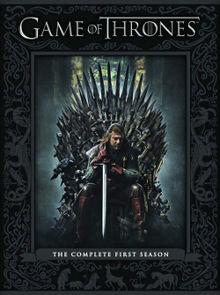
(Judge Dredd Megazine, Rebellion. Apologies for the embarrassing error in the text – as every Thrones fan knows, Ned Stark is most definitely not the brother of Robert Baratheon, although the script specifies they’re close _like_ siblings.)
The television series Game of Thrones, whose first season (ten hour-long episodes) has come out on DVD, is a long-haul story. We know there’ll be a second screen helping – the new season debuts in America in April – but whether we’ll ever see the “end” on TV is in the lap of the old and new gods. The first season adapts the eponymous 1996 book by George R.R. Martin. Like many fantasy novels, it merely opened the saga, with four books published since, and two more to come. (Volume three, A Storm of Swords, was published in two halves in Britain.) The series is collectively called A Song of Ice and Fire, but TV producer HBO – home to The Sopranos, The Wire and True Blood – is sticking with the Game of Thrones title, perhaps feeling that Song of Ice and Fire sounds naff.
Game of Thrones is often described as an epic fantasy for people who don’t like epic fantasy, though I’d be like to know if a survey has checked (“Yes, I think over-twelves who read Tolkien or Rowling should be shot”). True, Martin’s medievalised world has no hobbits or elves; the one dwarf character is an extremely human dwarf (played by a mellifluously-spoken, show-stealing Peter Drinklage); and any organised magic or faerie realms are in deep cover. What “fantasy” there is is held to the edges, just real enough to open up possibilities beyond a history drama. Non-human creatures cameo in the opening and closing scenes; we’re told matter-of-factly this world’s summers and winters last many years.
The first season’s power-play drama is as close to alternate history as it is to genre fantasy; Martin’s template was the War of the Roses. A cluster of seven kingdoms (beautifully mapped in the animated opening titles), is overruled by Robert Baratheon (Mark Addy), who sits on a throne made from the swords of failed pretenders. Robert, though, is less central than his brother Ned Stark (Sean Bean), who rules in the frozen north. The story begins when Robert’s right-hand man dies, and the king orders Ned to take the job, thrusting him and his family into a cauldron of court intrigues, bound up with the fate of Ned’s predecessor.
Game of Thrones was filmed in Northern Ireland and Malta, impressive presences on cinema-scaled television. The show doesn’t sing the landscapes like Peter Jackson’s New Zealand, but that’s never its point. Another strand involves Ned’s bastard son Jon Snow (Kit Harington) who opts for a social exile’s life on an ice wall, past which there be Things in the cold and dark. Another plot, across a sea in hotter climes, sees an exiled prince (Harry Lloyd) offering his seemingly dutiful sister (Emilia Clark) to a Genghis Khan-style warlord (Jason Momoa), hoping the brute will invade on his behalf. As with Robert and Ned, it’s the ostensibly subservient character who becomes central to the series.
Martin is not the first person to replay War of the Roses with fanciful margins round the conflict. I was reminded of The Prince in Waiting, a 1970 British “young adult” book by John Christopher, who died this February. Game of Thrones, though, presents itself as a very adult epic fantasy, and a laundry list of Things Peter Jackson’s Middle-Earth Couldn’t Have: disembowelings, bloody beheadings, full-frontal shagging, swearing, shagging, brothels, shagging, incest and shagging. The first episode alone has decapitations, a sword gutting, brothel romps and a maiden at her bath. All good fun, but a dubious way to get non-converts to see this as “real” drama, not the TV equivalent of a Frank Frazetta pin-up. The series frequently recalls the ‘70s BBC Roman drama I, Claudius, which had a world every bit as decadent, depraved and dirty, without actually becoming softcore porn.
It’s a shame, as Game of Throne generally deserves its plaudits for strong characters, splendid acting, well-turned dialogue (despite its “Because we can” coarseness), and a story led by encounters and verbal parryings. There are a great many fine scenes, including a phoenix-from-the-ashes finale showing nudity can empower. The dramatic standard is set by an early meeting between two mothers; one reveals a devastating confidence about her dead child, while concealing a far more toxic secret. The princess-and-warlord plotline is racially rum – a porcelain-skinned maid, in a land of swarthy savages! – but its reversals are bitterly satisfying. If you’re married to a monster conqueror, then take heed – it’s not much good playing nice with his victims.
It’s best to think of this DVD set as the first ten episodes, not a season. The last chapters have some “resolutions” – including a very memorable chop – but no finished arcs, and the survivors are all spread out at the end. My main qualm, not having read the books, is that the action looks set to get progressively “bigger,” and budgets in TV shows tend to go down, not up. There’s an enormously cheeky moment where a character gets stupidly knocked out just before a major battle, allowing the show not to depict the fighting. (There was a similar bit in The Hobbit book, which Peter Jackson is unlikely to reprise.) Game of Thrones is good enough to get away with the joke once, but audiences will be wise now. It’s possible that the main suspense in later seasons will come from, “But what can they actually show?”
(c) 2018 Rebellion A/S. Reprinted with permission.
[amazon_link asins=’B004LRO176,B07539JQTG’ template=’ProductCarousel’ store=’anime04c-21′ marketplace=’UK’ link_id=’8bd9fb82-9c52-11e8-9d34-9b3e510a64ca’]
